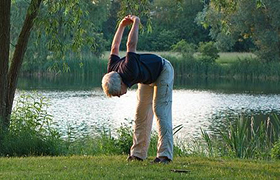Fіtnеѕѕ at 60+
Walking to remain healthy
Walking presents an uncomplicated, free and straightforward method of staying more active, reducing weight and becoming healthier. It is many times ignored as a kind of exercise; however, walking fast can assist you to develop strength, burn extra calories and promote a healthier heart. It is not necessary for you to walk for many hours. A quick daily walk of 10 minutes provides many health benefits, and it plays a role in your recommended 150 minutes of weekly workout. For other ideas of working out, study our workout guides.
Before you begin
Any trainers or shoes that are comfy and offer enough support and do not produce blisters are suitable. If you walk to work, you can wear your regular work attire with a comfortable pair of shoes, and when you get to work, you can change shoes. For walks that are long, you can carry some water, an extra top, healthy snacks, a sunhat and sunscreen in a small backpack. If you begin walking long distances often, you should buy a waterproof jacket and some special walking shoes for difficult paths.
How can I tell that I am walking sufficiently fast?
- A quick walk is around three miles per hour; this is quicker than a stroll
- One method of finding out whether you are walking fast is if you can continue talking but cannot sing the words to a song
- Also, you can attempt making use of your smartphone’s Active 10 app, which is free
- It gives you information about whether you are walking sufficiently fast and recommends methods that can include faster walking
- Download the app for Active 10 from Google Play and the App store
What if I do not exercise a lot?
- If you do not engage in activities but can walk, slowly increase the distance that you walk
- If you have an issue with joints, find out whether the swimming pool in your area provides workout classes
The water assists to sustain your joints while you are in motion and after you shed some weight, there will be a decrease of the strain on your joints. If a medical condition prevents you from being active, seek suggestions on working out with a disability. If you cannot go outdoors, check whether one of the free workout videos we provide can assist.
Be Inspired
Form a habit
The simplest way to walk more is to turn walking into a pattern. Get methods of including walking in your everyday routine. Illustrations are:
- Walk some distance while going to work
- Walk to the shops
- Use the stairs rather than the lift
- For short trips, do not use the car
- Walk the children to school
- Go for regular walks with a buddy
- Stroll with friends or family after supper
If you reside in a city, Walkit presents an interactive walk organizer to assist you to get an ideal walking path. Each recommended route includes the time of your journey, carbon saving, step count and calorie burn. Hikideas makes use of a device that you can utilize for planning non-urban and urban walks.
Listen to music
Walking as you listen to a podcast or music can distract you from the effort. Also, music can make you acquire a rhythm and assist you to quicken your pace. It will amaze you to discover how quickly time passes when you walk as you listen to songs you love.



Utilize the Active 10 app
With Active 10, you can monitor the distance you have walked and the time you took. To make things enjoyable, it offers you objectives to attain and gifts for your achievement. Go to Google Play and the App Store to download Active 10.
Combine things
Make your walks different. You do not need to head to the countryside for an adequate walk. Cities and towns provide walks that are fun, such as canal towpaths, parks, riverside paths, woodlands, commons, nature reserves, and heaths. For motivating walks, go to Walk Unlimited. For people who use wheelchairs, go to Walks with Wheelchairs and for parents, who have buggies go to Walks with Buggies.
Be part of a walking group
Walking as part of a team provides an efficient manner to begin walking, forge new friendships and remain inspired.
Drinking Alcohol
What length of time does alcohol remain in your blood? It usually takes an hour for your body to assimilate a single unit of alcohol. But, this differs according to:
- How heavy you are
- Your gender (male or female)
- How old you are
- How fast or slowly your body transforms food into energy (your metabolism)
- The quantity of food you have consumed
- The kind of alcohol it is and its potency
- Whether you are on medication and if yes, the type
- Also, it can take longer if your liver’s functioning is ineffective
What does a single unit constitute?
A single unit is the same as 10ml or 8g of pure alcohol. There are about: 2.1 units in a regular glass (175ml) of wine with average concentration (12%) Three units in a big glass (250ml) of wine of average strength (12%) Two units in one pint of mild lager, cider or beer (3.6%) Three units in one pint of cider, beer or lager of higher-strength (5.2%) One unit in one measure of spirits (25ml)
Summing up your units
If you drink a big glass of wine (250ml), it takes three hours for your body to absorb the alcohol. If you take a single pint of beer, your body takes around two hours to absorb it. A single pint of strong lager is the same as three units; therefore, it is going to take more time. But, this period can change; it is determined by the elements mentioned previously. If you take some drinks when you go out at night, it could take a lot of hours for alcohol to come out of your body. The following day, it is possible that the alcohol might still be inside your body. It signifies that if you drive the following day after an evening of drinking, you may have exceeded the permitted alcohol limit.
Learn about your units
To lower the danger of hurting your health if you drink many weeks:
- It is advisable for women and men to avoid regularly drinking more than 14 units each week
- Divide your drinking over three or more days if you drink a maximum of 14 units each week

Treatment for Hangover
A severe headache, dizziness, sickness, and dehydration; any person who has drunk excessively is aware of the repercussions. Alcohol increases your rate of urinating, which can cause dehydration. Dehydration is what leads to a lot of the hangover symptoms. Treatments for hangover are mainly legendary. A hangover has no cure; however, there are steps you can take to prevent one, and if you have one, reduce any discomfort.
Tips for preventing a hangover
To prevent a hangover:
- Avoid drinking more than you are aware your body can handle. If you are not sure of this quantity, take care
- Avoid drinking if you have not eaten. Before going out, eat some food that is inclusive of carbohydrates (like rice or pasta) or fats. The meal shall assist to reduce the absorption of alcohol in the body
Do not take drinks that are dark-colored if you have learned that you are sensitive to them. They have natural chemicals known as congeners, which make the blood vessels irritated and the tissue inside the brain can worsen a hangover. Take water or soft drinks that are non-fizzy in between every alcoholic beverage. Carbonated (fizzy) liquids hasten alcohol absorption in your system. Drink one pint or more of water before sleeping. Place a glass of water next to the bed to sip if you get up in the course of the night.
Treatment for Hangover
If you are experiencing a lousy feeling the following morning, it is likely that you did not adhere to our suggestions. Handling a hangover entails rehydrating the body to assist it to treat the irritating signs. The ideal period to rehydrate is before sleeping following a drinking session. Painkillers can help with muscle cramps and headaches. Sugary meals can assist to lower your tremors. In some instances, an antacid might be required to calm your stomach first.
Bouillon soup, (a light vegetable-based liquid is a healthy source of minerals and vitamins, which can replenish exhausted resources). Its key benefit is that it is simple to digest for a weak stomach. You can get back lost liquids by drinking plain liquids that the digestive system can absorb easily such as soda water, isotonic fluids and water.
What to Keep away from
‘Fight fire with fire’…taking extra alcohol is not helpful. Drinking in the morning is a habit that is dangerous, and you might just be postponing the emergence of signs until the alcohol wears off once more. If you have drunk heavily, whether you have a hangover or not, doctors suggest that you wait at least 48 hours before taking any more alcohol to provide your body with recovery time. At times, apparently, a hangover makes that suggestion simpler to follow:
Advice for Low-risk drinking
To minimize health risks if you drink often:
- It is advisable for men and women to avoid 14 units and more each week regularly
- Split your drinking over three days or more if you often drink a maximum of 14 units each week
- In order to reduce, try to avoid drinking for some days every week
Fourteen units are the same as 6 pints of beer with average strength or 10 small glasses of mild wine.
Alcohol calories
Are you aware that a regular class of wine can consist of the same amount of calories as one piece of chocolate and one pint of beer has around a similar quantity of calories as one packet of chips? In England, the regular wine drinker consumes about 2,000kcal each month from alcohol. Drinking five pints of beer each week sums up to 44,200kcal in one year, which is equal to consuming 221 doughnuts.
Increase in weight
Cider, beer, wine, and spirits and each of the drinks we like are created from natural starch and fermentation and sugar and distillation for the specific drink are utilized to provide the alcohol content. It demonstrates the reason alcohol has plenty of calories; seven calories in one gram is nearly as much as one gram of fat. And, naturally, extra calories are available in included mixer drinks. Drinking often more than what the NHS suggests can have a visible effect on your waistline also and lead to other severe health issues that are not as obvious.



Tips to prevent increase in weight
It is suggested that men and women should not often drink 14 units and more each week. It is equal to six pints of beer of average strength or 10 small glasses of mild wine. Substitute an alcoholic drink with one glass of water; this shall assist to avoid you becoming dehydrated. Avoid drinking if you have not eaten. If you are not eating snacks as you drink, choose a healthier option.
Drinking in rounds makes you drink more than you planned. Do not take part in this and drink at your speed. Make an effort with a friend to cut intake, as it will be simpler for you to adhere to it with moral support. Consume dinner, which is healthy before you start drinking. Cook or order before you begin drinking to avoid you becoming tempted to choose options that are less healthy.
Control yourself by taking tiny sips
Do not ‘binge drink.’ It is not wise to ‘store’ your units to go on a drinking spree at the weekend. In case you are drinking white wine, you can include a splash of soda water to assist the similar quantity of units to last longer.
Tips on reducing
If you often drink 14 units and more each week, endeavor to attempt these simple guidelines to assist you to reduce. Fourteen units are equal to six pints of beer with average-strength or 10 small glasses of mild wine. Devise a strategy.
- Before you begin drinking, fix a restriction on the quantity you will drink
- Set up a budget
- Just take a set amount of cash to use on alcohol
- Inform them
- If you inform your friends and family that you are reducing and it means a lot to you, they might support you
- Realize that progress will be gradual
- Reduce a little every day. In this manner, you shall make an achievement each day
- Take smaller quantities
You are still able to enjoy a drink; however, drink smaller sizes. Attempt bottled beer rather than pints or a small glass of wine, rather than a big one.
Have a drink with lower strength
Reduce the alcohol by exchanging strong wines or beers with ones whose concentration is more moderate (ABV in %). This information is available on the bottle.
Maintain hydration
Take one glass of water before you drink alcohol and substitute alcoholic drinks with a soft drink or water. Have a break. Stay for some days without drinking every week.
Advantages of reducing
The instant impacts of reducing are:
- Feeling good in the mornings
- Being less fatigued during the day
- Your skin might improve in appearance
- You will begin to feel fit
- You might stop gaining weight
Permanent benefits are:
Mood
Drinking heavily is strongly connected to depression, and you usually feel worried and low due to hangovers. If you are already anxious or unhappy, drinking can worsen this; therefore, reducing might enhance your mood.
Sleep
Drinking can have an impact on your rest. Even though it can assist some individuals to fall asleep fast, it can interfere with your sleep patterns and prevent you from sleeping soundly. Therefore reducing alcohol can help you to feel more relaxed when you wake up.
Behavior
Drinking can have an impact on your decision-making and actions. You might act unreasonably and violently when you are inebriated. Loss of memory can be an issue when drinking and in future for people who drink heavily regularly.
Heart
Drinking heavily for a long time can cause your heart to enlarge. This condition is severe, and it is not possible to reverse it entirely; however, discontinuing drinking can prevent it from worsening.
Immune system
Drinking often can impact your immune system. Heavy drinkers are prone to getting more infectious illnesses.












